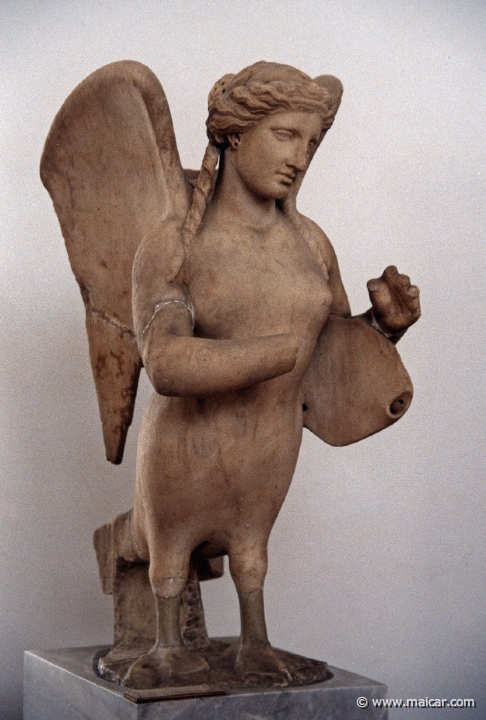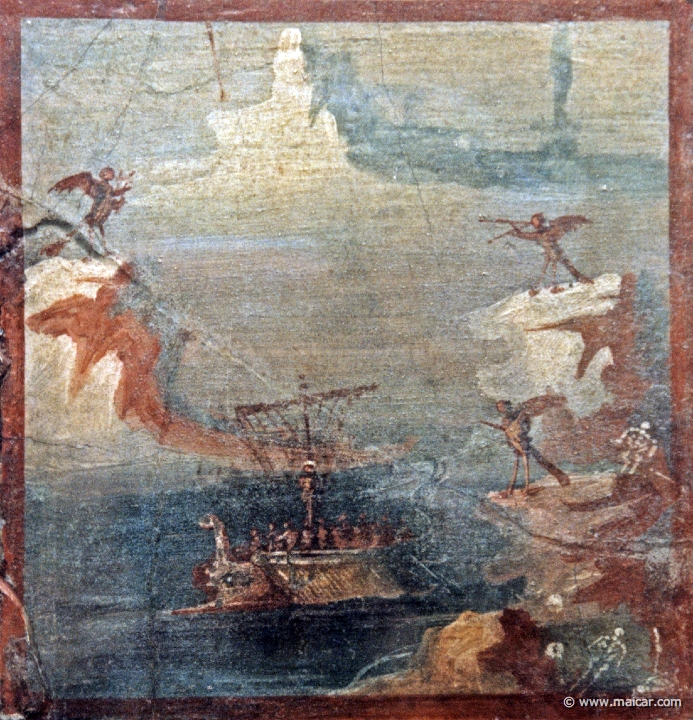|

|
6236: Funerary siren mourning with primitive tortoise-shell lyre. Mid-4th century BC. From the Kerameikos. National Archaeological Museum, Athens.
|
|
The SIRENS, they say, had maidens' features, but from the thighs down they had the forms of birds. One of them played the lyre, another sang, and another played the flute. By these means, and by clever, knavish, and deceitful words, they persuaded passing mariners to linger, thus causing their destruction. That is why the island where they lived was full of the bones of those who had perished. The SIRENS are thought to be three, but the names given are more: Aglaope, Leucosia 2, Parthenope 3, Pisinoe 1, Thelxiepia.
Former companions of Persephone
The SIRENS had been companions of Persephone before she
was ravished by Hades.
Having sought for her in vain, they prayed that
they would grow wings, and that they might not
loose their tuneful voices. Once their wishes were
granted by the gods, they sang in unison with the
music of the MOERAE.
Their feathers plucked
It is also told that Hera persuaded the SIRENS
to compete with the MUSES.
But these, invincible as ever, won with their
songs, and having plucked out the SIRENS' feathers,
they made crowns for themselves out of them.
The ARGONAUTS pass
by them
When the ARGONAUTS sailed past the SIRENS, Orpheus chanted a counter melody to protect his companions, but the Argonaut Butes 1 (son of Zeuxippe 1, daughter of the river god Eridanus) swam off to the SIRENS, and would have perished had not Aphrodite carried him
away.
Prophecy
It was predicted, however, that the SIRENS would
die when a ship passed them unharmed. And since Odysseus succeeded in
escaping them, no one else has met them, which
indicates that they are forever dead and gone.
One reason for their absence
It is well known that no one returns from the Underworld (except
for a few), and it has been conjectured that all
who die are being kept there, not by Compulsion
(which would not be strong enough), but by the
strongest of bonds, Desire, which Hades himself entertains.
"... not even the SIRENS, but they and all others have been overcome by his (Hades) enchantments ..."
for
"... so
beautiful, as it appears, are the words which Hades has the power to speak."
this god being
"... a great
benefactor of those in his realm." (Socrates. Plato, Cratylus 403e).
|

|
8230: Ulysses resists the song of the sirens. Roman c. AD 50-75. Pompeii. British Museum, London.
|
|
How Odysseus escaped
them
But Odysseus heard
their lovely song. For he, following Circe's instructions,
stopped the ears of his comrades with beeswax, and
ordered that he should himself be bound to the
mast, so that he could hear the voices of the
SIRENS, who then sang:
"Draw near ...
illustrious Odysseus, flower of the Achaean chivalry,
and bring your ship to rest that you may hear our
voices. No seaman ever sailed his black ship past
this place without listening to the sweet voice
that flow from our lips, and none that listened has
not been delighted and gone on a wiser man. For we
know all that the Achaeans and Trojans sufferer on
the broad plain of Troy by the will of the gods,
and we have foreknowledge of all that is going to
happen on this fruitful earth." (The SIRENS to Odysseus. Homer, Odyssey 12.184).
When he heard their persuasive song, he strongly
desired to linger and begged to be released, but
his comrades bound him tighter, until they had
sailed past them.
Death of the SIRENS
This is how Odysseus defeated the SIRENS, and yet heard their voices. According to what had been prophesied, they then flung themselves into the depths of the sea and perished. The body of one of them, Leucosia 2, appeared on the shore of the island off Leucania in southern Italy, which was called after her.
Mourning voices
The SIRENS were believed to join those who mourn
with their voices. That is why Helen, in a moment of
grief, says:
"Oh, as I
begin the great lament of my great distress, what
mourning shall I strive to utter? or what Muse
shall I approach with tears or songs of death or
woe? ... Sirens, may you come to my mourning with
Libyan flute or pipe or lyre, tears to match my
plaintive woes." (Helen. Euripides, Helen 165 ff.).
|